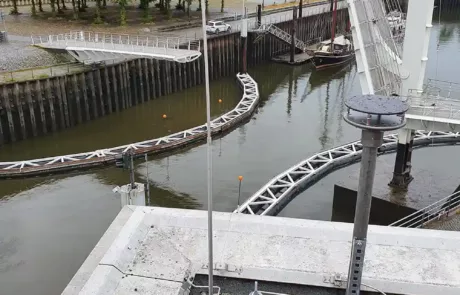MOTOR CONTROL FOR A BASCULE BRIDGE
Motor control of a bascule bridge using control cabinet control
MOTOR CONTROL FOR A BASCULE BRIDGE
Motor control of a bascule bridge using control cabinet control
PICTURE GALLERY
PROJECT DESCRIPTION
In compliance with the risk analysis, a new state-of-the-art control system has been installed.
The bridge allows pedestrians and cyclists to cross a harbor access road.
The entire system is controlled via a control cabinet array. Normally the bridge is closed. If a ship wants to pass, the barriers close for pedestrians, which is signaled both acoustically by a bell and visually by warning lights. The bridge is then unlocked and raised by a motorized winch. The motor is controlled by a powerful frequency inverter. The traffic lights for shipping turn green and the ships are allowed to pass.
After the traffic lights have switched to red, the bridge is closed again, locked and the pedestrian barriers are opened.
An HMI is located on the side of the winch house, from which the bridge can be controlled in manual or automatic mode. One of the emergency stop mushroom pushbuttons is also located there, which brings the bridge to a standstill when pressed (SS1).
The entire bridge can be viewed via the harbor master’s office, where there is a mobile HMI with the same functions.
On the other side of the bridge is a robust external control cabinet that controls the equipment on this side of the port. Communication between the cabinets takes place via fiber optics.
Several wind measuring stations also continuously measure the current wind speed, as the bridge may no longer be operated above a certain wind speed.
PROJECT DESCRIPTION
In compliance with the risk analysis, a new state-of-the-art control system has been installed.
The bridge allows pedestrians and cyclists to cross a harbor access road.
The entire system is controlled via a control cabinet array. Normally the bridge is closed. If a ship wants to pass, the barriers close for pedestrians, which is signaled both acoustically by a bell and visually by warning lights. The bridge is then unlocked and raised by a motorized winch. The motor is controlled by a powerful frequency inverter. The traffic lights for shipping turn green and the ships are allowed to pass.
After the traffic lights have switched to red, the bridge is closed again, locked and the pedestrian barriers are opened.
An HMI is located on the side of the winch house, from which the bridge can be controlled in manual or automatic mode. One of the emergency stop mushroom pushbuttons is also located there, which brings the bridge to a standstill when pressed (SS1).
The entire bridge can be viewed via the harbor master’s office, where there is a mobile HMI with the same functions.
On the other side of the bridge is a robust external control cabinet that controls the equipment on this side of the port. Communication between the cabinets takes place via fiber optics.
Several wind measuring stations also continuously measure the current wind speed, as the bridge may no longer be operated above a certain wind speed.
PICTURE GALLERY
CUSTOMER ADVANTAGE
In the course of modernization work as part of flood protection, the control system of a folding pedestrian bridge had to be replaced.
Following the work carried out by Sourcetronic, the pedestrian bridge once again meets the specified safety standards. The modernization has also brought the bridge back up to the latest technical standards, enabling it to operate in an energy-efficient manner.
DATA & FACTS
Autonomous securing of the water supply for the botanical garden
Energy-efficient use of pumps through frequency control
PERFORMANCE
Project planning and design of the control cabinets
Switch cabinets built and installation on site
Programming the PLC
Standard-compliant testing and documentation
PERFORMANCE
Project planning and design of the control cabinets
Switch cabinets built and installation on site
Programming the PLC
Standard-compliant testing and documentation
CUSTOMER ADVANTAGE
In the course of modernization work as part of flood protection, the control system of a folding pedestrian bridge had to be replaced.
Following the work carried out by Sourcetronic, the pedestrian bridge once again meets the specified safety standards. The modernization has also brought the bridge back up to the latest technical standards, enabling it to operate in an energy-efficient manner.
DATA & FACTS
Autonomous securing of the water supply for the botanical garden
Energy-efficient use of pumps through frequency control


